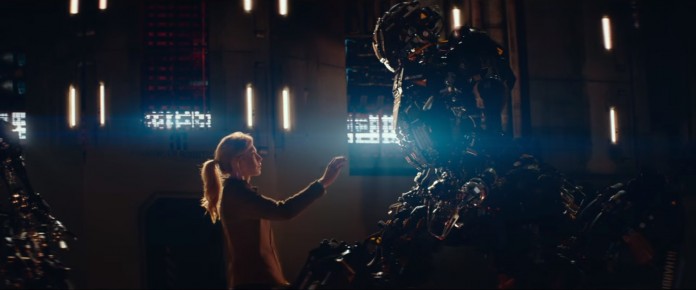When dealing with science fiction endeavours, set in the not-too-distant-future, there’s an obligation for the audience to suspend their disbelief accordingly, as we come to terms with a whole new world, with a different set of rules to abide by. Steven Gomez’s Kill Command has made this a relatively smooth process for the viewer, grounding his debut feature in humanity, with an exceedingly simplistic, accessible narrative for the audience to immerse themselves in. Effectively, it’s just one of survival, and while the broader context of the world we’re inhabiting is essential, what plays out could be set anywhere, and at any point in time.
The picture surrounds a group of soldiers – led by Captain Bukes (Thure Lindhardt), called to a remote, desolate training facility under somewhat mysterious circumstances, alongside Mills (Vanessa Kirby) – a source of great resentment for the collective, given she’s technologically advanced and effectively, on the other side, as a part machine/human hybrid. Upon their arrival, what was sold as a fairly basic exercise soon turns in to a blood bath, as the marines find themselves the targets of a brutal collective of machines. Why this is the case remains to be seen, as all they can focus on for the time being, is getting out alive.
The film thrives off the notion of ambiguity, as we embody the role of Mills, whose allegiances remain somewhat elusive. We gather that she knows the answers to the countless questions posed by the soldiers, and yet we remain as mystified as they do. This subverts the norm, as usually when taking on the perspective of a certain character, we are as clued up as they may be – but this turns that notion as its head, as even the viewer is kept at arm’s length in this instance.
Gomez studies our ever expanding relationship with technology with an intelligent, yet pointed eye, and the idea that our jobs could, in theory, be in jeopardy and become redundant in the future as advanced machines take over – which has already been put into practise in certain areas, with driver-less taxis on the horizon, for example. Gomez studiously lingers over the concept that while humans are flawed and more error prone that their artificial counterparts, what could happen in the machines are programmed incorrectly? If there’s a fault in the system? What if those set out to protect us, work against us? That poses a far more terrifying threat than any potential human mistake.
But where this picture deserves the most commendation, is within the aesthetic, as a film that defies the somewhat limited budget provided. You’d never for one minute be able to tell this was made on such modest resources, which Gomez has truly maximised to its full potential. Coming from the producers who brought us Monsters, the man at the helm of that impressive project, Gareth Edwards, went on to direct Godzilla and is now working on Rogue One: A Star Wars Story. On this showing it would come as little surprise to see Gomez take a similar path.






